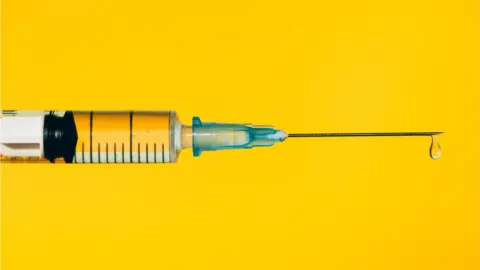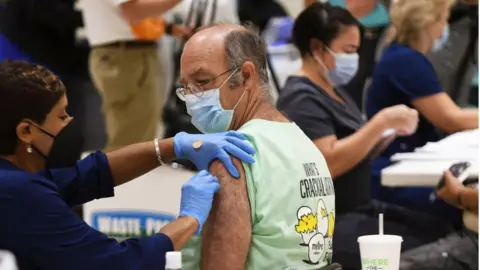Covid boosters: US approves Moderna and J&J shots
 Getty Images
Getty ImagesThe US has approved Moderna and Johnson & Johnson vaccines to be used as booster jabs, and said Americans can now receive doses of vaccines that are different from the one they initially received.
The green light for mixing-and-matching comes a month after the Food and Drug Administration (FDA) authorised Pfizer booster jabs for some Americans, including those over 65 or at higher risk of severe illness and who work in frontline jobs.
Less than 5% of Americans have so far received a booster jab, according to US health officials.
But with tens of millions of US residents already eligible for a third shot, many remain confused about boosters, who needs them and how they help.
Here's what we know so far.
What's the status of each vaccine?
Pfizer
Numbers: To date, more than 103 million US residents have been fully vaccinated with two Pfizer doses, while approximately 7 million have received boosters.
Efficacy: Data shows that a full dosage of the Pfizer vaccine is 88% effective in preventing hospital admission. CDC data released in mid-September shows that the vaccine's effectiveness falls to 77% after 120 days.
Company Claim About Booster: Pfizer has been supportive of the need for boosters, with CEO Albert Bourla telling reporters that studies have shown that the vaccine's effectiveness steadily declines to about 84% for vaccinated people four to six months after receiving their second dose.
FDA Ruling: Pfizer boosters have been approved for older adults and 50 to 64 year olds with medical conditions, as well as adults with underlying medical conditions or those who live and work in high-risk settings.
Moderna
Numbers: To date, more than 69 million people have been fully vaccinated with the Moderna vaccine, with about 1.5 million people having received Moderna booster jabs.
Efficacy: New data shows that Moderna's vaccine was about 93% effective at reducing the risk of being admitted to hospital with Covid-19. It stays about 92% effective after 120 days.
Company Claim About Booster: Moderna has said that a half-dose booster jab would boost antibodies to a higher point than the initial two shots and believes a booster will be necessary "prior to the winter season". Currently, Moderna boosters have only been approved for certain people with weakened immune systems, such as cancer patients or transplant recipients.
FDA Ruling: The FDA approved people 65 and older and those with weakened immune systems to receive a half-dose of the vaccine, six months after their last jab. And the CDC has authorised Moderna boosters.
Johnson & Johnson
Numbers: Nearly 15 million US residents have received a Johnson & Johnson (J&J) vaccine, which is administered in one dose. CDC data shows that only about 9,800 people have so far received J&J boosters.
Efficacy: Research shows that the J&J vaccine is 71% effective in preventing the need for hospital care. After just 28 days, the vaccine's effectiveness falls to 68%.
Company Claim About Booster: Like Moderna, J&J had submitted a request for emergency use authorisation for its booster jab. In late September, the company said that research shows that a booster provides a nine-fold increase in antibodies. Four weeks later, it had climbed to a 12-fold increase.
FDA Ruling: The FDA recommended that boosters be given to anyone over 18, at least two months after the initial dose.
A number of panel members said that J&J should ultimately be considered a two-dose vaccine like Pfizer's and Moderna's.
Preliminary data from a federal clinical trial released earlier this month suggested that those who received a J&J vaccine may benefit more from having a Moderna or Pfizer booster.
The research showed that those with a J&J vaccine followed by Moderna or Pfizer boosters saw significantly higher antibody responses than with an extra dose of J&J.
The researchers noted that the data suggests "that if a vaccine is approved or authorised as a booster, an immune response will be generated regardless of the primary Covid-19 vaccination regimen."
- MAPS AND CHARTS: Covid map: Where are cases the highest?
- FEATURE: Could 241m vaccine doses go to waste?
- REALITY CHECK: Biden on vaccines fact-checked
What scientists are saying
 Getty Images
Getty ImagesDr Priscilla Hanudel, a Los Angeles-based emergency doctor, told the BBC she isn't surprised that people are confused.
"There's so many different steps in the process. I think it can be a little hard for people to understand until final approvals are in," she said.
Currently, Dr Hanudel recommends that immunocompromised people "definitely" receive an additional dose of the vaccine. She believes that it is likely that boosters will be authorised for the general public as immunity wanes.
"I think it's going to look similar to the flu shot once a year," she said. "Whether that's a booster or thought of as just another annual shot, I think it's going to happen forever for everyone eventually."
Julia Raifman, an assistant professor at Boston University's School of Public Health, said that the debate over boosters is a sign that the US needs to "reset" pandemic policymaking.
"Strong, clear, well thought out and vetted messages from national leaders is key to communicating in a crisis," she said. "We didn't see a well-developed policy decision with boosters or with the May guidance that people remove masks. In both cases it really undercut public health."
Dr Monica Gandhi, an infectious diseases physician and professor at the University of California San Francisco, said that while she believes that immunocompromised people and at-risk frontline workers should get additional jabs, other vaccine doses should be sent abroad to countries with low vaccination rates.
"There's a moral and ethical obligation. We've had these vaccines for 10 months and we managed to only get 4% in the hands of low-income countries," she said.
The World Health Organization has called on wealthier nations to hold off on widespread rollouts of booster shots until vaccination rates go up in lesser developed countries. In September, WHO Director-General Tedros Adhanom Ghebreyesus said it was "really not right" to give boosters to "healthy populations".
Dr Gandhi added: "From a public health perspective, no one is safe from the emergence of other variants unless we get transmission down worldwide."
Dr Francis Collins, the director of the US National Institutes of Health, told BBC News on Thursday that the US can give boosters to its own citizens while also providing help to other nations at the same time.
"It think it's probably not correct to set these two against each other. It's not about either/or. We should be doing both/and," he said.
